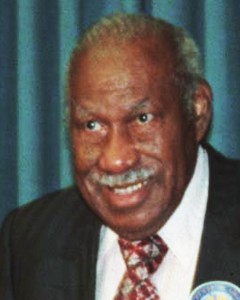Remembering Rev. Avery Alexander
10th February 2020 · 0 Comments
Long before there was Take ‘Em Down NOLA, there was the Rev. Avery C. Alexander, a fearless civil rights warrior and a tireless public servant. More than two decades after his death, “Rev,” as he was affectionately called by all who knew and revered him, remains a towering figure in the history of Black New Orleans and one of the pioneers of the historic Civil Rights Movement.
Avery Caesar Alexander, who was born on June 29, 1910, was a trailblazing Louisiana civil rights leader and public servant who used the state legislature to further the aims and goals of the historic Civil Rights Movement. He graduated from Union Baptist Theological Seminary and was ordained into the Baptist ministry in 1944. He was elected to the Louisiana House of Representatives as a Democrat in 1975 and served in that office until his death.
He participated in voter-registration in Louisiana prior to passage of the Voting Rights Act of 1965. He helped organize economic boycotts against businesses in New Orleans that refused to hire Blacks, including a successful boycott to force the monopoly utility and transit company to hire Black bus drivers.
Alexander participated in several marches with the Rev. Dr. Martin Luther King Jr., and in sit-ins to desegregate lunch counters. In a well-publicized and videotaped incident in the basement cafeteria at City Hall on October 31, 1963, he was arrested and dragged upstairs by the heels. In a similar incident in 1993, police used a chokehold to subdue Alexander when he participated in a protest against former Ku Klux Klan Grand Wizard David Duke at the Battle of Liberty Place Monument ceremony in New Orleans after Alexander repeatedly crossed police lines separating protesters and celebrants.
The City of New Orleans did not remove the Liberty Place Monument, which celebrated white supremacy, from the public space it occupied near the foot of Canal Street until nearly two decades later.
After becoming an ordained Baptist minister of the Union Baptist Theological Seminary, the Rev. Alexander joined the NAACP to become an activist within the historic Civil Rights Movement. Throughout his duration as an activist, Alexander performed many political stances upon segregation and racial discrimination in New Orleans. For instance, leading bus boycotts against racial discrimination of African-American employees. As well as his “lunch-counter sit-in,” in 1963, aimed to integrate public cafeterias. Continually, Alexander was even known to throw out wooden barriers used to racially separate whites from Blacks in street cars.
Yet Alexander’s most famous boycott stance was his “lunch-counter sit-in” of 1963 in the basement of New Orleans City Hall. Along with several other activists, Alexander and the other civil rights activists’ goal was to not leave the segregated cafeteria until they had been served a meal or arrested. For five hours, Alexander and his peers sat refusing to leave. It wasn’t until New Orleans police arrived that Alexander and his cohorts were removed. Alexander specifically was televised being dragged by his heels up the basement’s steps with his head banging on the staircase.
Furthermore, within the same time frame, Alexander influenced Black communities to invest their expenses into non-racial businesses. For example, white store owners located within a commercial zone on Dryades Street were prone to refuse African-American employees. By Alexander advocating boycotts against similar commercial zones, several Black communities adhered to Alexander’s stance and invested their money into non-racial community zones, causing many stores located on Dryades Street to go out of business.
In 1975, Alexander became a Democrat to represent the 93rd District of Louisiana House of Representatives. In 1977, he along with nine other state legislators together established the Louisiana Legislative Black Caucus as a way to increase the African-American state legislature ratio. Alexander also served as the chaplain of the Black caucus and due to his political and religious background became known as “Rev.” He also established a non-denominational church, the Church of All People, in 1990.
In 1999, McDonogh #39 School on St. Roch Avenue was renamed after him. The official name of the now-dormant Charity Hospital is Avery C. Alexander Memorial Hospital. Pontchartrain Expressway was also renamed in his honor. Also, a statue of Alexander was placed in Duncan Plaza across from City Hall where he previously boycotted in 1963 to integrate the public basement cafeteria. However, due to Hurricane Katrina, the statue, known as “The Crusader,” was relocated and placed in front of the remodeled University Medical Center at Galvez and Canal streets.
Well into his 80s, “Rev.” continued to fight for the rights of oppressed and underrepresented people in south Louisiana and across the U.S.
The Rev. Avery C. Alexander remains a looming figure in the Civil Rights Movement and is often mentioned alongside other civil rights luminaries like Judge Israel Augustine, the Rev. Abraham “A.L.” Lincoln Davis, civil rights lawyer Alexander P. Tureaud Sr. and former Mayor Ernest “Dutch” Morial.
Former Louisiana Weekly editor Edmund W. Lewis was among those who traveled to the North Shore with Rev. Alexander in the late 1990s to protest the police killing of a Black man who was living with a white woman.
“Rev. never stopped,” the Rev. Raymond Brown, a community activist and president of National Action Now, told The Louisiana Weekly.
“That was one of the things I loved about him and one of the things that is sorely missed in the local civil rights community today. He never “ran out of steam and never backed down from a fight.”
Brown, who was arrested along with Alexander, Henry Julien, Endesha Juakali and others at the Liberty Place Monument protest in 1993, often joined Alexander and other activists on the battlefield in the 1980s and 1990s, told The Louisiana Weekly, “Rev. was willing to do whatever it took to gain equality and justice for people who have systematically been locked out of the American Dream.”
This article originally published in the February 10, 2019 print edition of The Louisiana Weekly newspaper.




